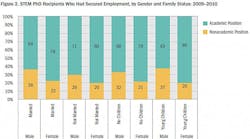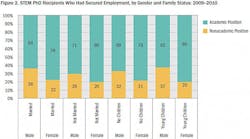How Demographics Affect Careers in STEM
How does your gender, marital status and family affect a career in science, technology, engineering and math?
According to a new report from the American Institutes for Research (AIR), a person's gender and if they have children significantly impact a career working in STEM.
AIR researchers analyzed data from 27,000 respondents to the National Science Foundation's Survey of Earned Doctorates, who in 2009 and 2010 reported having secured jobs at graduation.
"An academic career in a STEM discipline demands a continuous progression from college, graduate school, postdoctoral work and then an academic appointment," researchers Courtney Tanenbaum and Rachel Upton said. "This trajectory conflicts with the biological clocks of women who are beginning their careers when they are most likely to be starting a family or considering it. It could also hinder the success of men who want a better work-life balance."
Source: American Institutes for Research
The report found that female STEM PhD students are less likely to find a job after graduating, compared to men, but those that do tend to find an academic job.
"These results seem to affirm (but also complicate) prior scholarship suggesting that women, overall, may be getting pushed out or may be pulling out of research-intensive and more prestigious academic pathways early in their careers," states the AIR.
The report found that men who attain academic jobs were more likely than females to land faculty positions.
Regardless of gender, people who are married when completing their PhDs are less likely to attain academic jobs.
Having children does not hinder a female with a PhD's career opportunities. They had the same prospects as other counterparts without children.
On the contrary, Men with PhDs who had children were less likely to find academic jobs compared to counterparts who did not have children.
"Men are taking care of children and playing a bigger role at home and if we don't change these policies and practices, men, too, are going to be pushed into other types of career choices," reports Tanenbaum.


